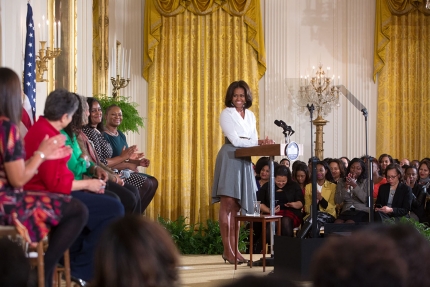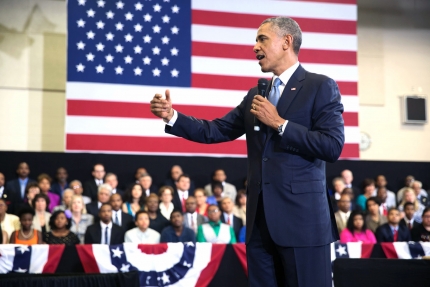Blog Posts Related to the African American Community
Honoring the Women of the Civil Rights Movement, Both Past and Present
Posted by on February 20, 2015 at 8:35 PM ESTIn 1957, Carlotta Walls, a 14-year-old African American girl living in Little Rock, Arkansas, elected to attend Little Rock Central High School. One of the nine students who desegregated the school, Carlotta was subjected to constant bullying, physical abuse, and violent attacks -- her parents' home was bombed in February of 1960. Shortly after, she earned her high school diploma.
In 1961, Charlayne Hunter became the first African American woman to attend the University of Georgia. Enduring everyday bigotry and racial slurs, and bottles and bricks thrown at her windows, Charlayne went on to get her degree -- which has since propelled her to a successful career as a journalist with NPR, PBS, CNN, and the New York Times.
These are just two of the influential women that took part in a special panel discussion this afternoon at the White House in celebration of Black History Month.
Learn more about Civil Rights, WomenThe White House to Host My Brother’s Keeper Community Challenge National Convening
Posted by on February 11, 2015 at 9:19 PM ESTLast February at the White House, the Administration was just preparing to launch My Brother’s Keeper, an effort to unlock the full potential of boys and young men of color and all youth — something that would not only benefit them, but all of America. Now, almost a full year from that day, we are hosting the My Brother’s Keeper Community Challenge National Convening here at the White House tomorrow.
The six universal goals identified in the My Brother’s Keeper Task Force report are forming the backbone of a larger effort in which cities, towns, and Tribal Nations across America are taking up the President’s call to improve life outcomes for all young people in their communities to create a society in which no one gets left behind and where all children have opportunities to succeed.
The Convening will bring together representatives from local communities across the country that accepted the Community Challenge and hosted local action summits so they can inspire and learn from each other. Experts from the private and public sectors will offer their insights and evidence-based suggestions on how to bring about real change. We are grateful to see that there are so many who have embraced the President’s call to action and are making real progress to expand opportunity for all our youth.
Learn more about , Civil Rights, Urban PolicyIn Ferguson — and All of Our Communities — Education Can Be the Great Equalizer
Posted by on February 10, 2015 at 11:37 AM EST
Ed. note: This is cross-posted on The Root. See the original post here.
Following Michael Brown’s tragic death, people across the country — and the world — have grieved together and engaged in critical conversations about race and community relationships. When President Barack Obama hosted a dialogue in December with young people on the issues in Ferguson, Missouri, I asked the youngest members of the Ferguson commission how I could be helpful. They asked me to visit Ferguson — to listen to the stories of the people who live there — because youth, in particular, were hurting.
I listened. Recently, I traveled to Ferguson. I visited the Clyde C. Miller Career Academy High School, Grandview High School, Ferguson library and the Greater St. Mark Family Church to meet with students, educators and community leaders to hear their thoughts on race, equity and trust since Brown’s death.
Learn more about Civil Rights, EducationBuilding Trust Between Law Enforcement and the Communities They Serve and Protect
Posted by on February 9, 2015 at 6:48 PM EST
Ed. note: This is cross-posted on the U.S. Department of Justice's blog. See the original post here.
Over the last several months, I have been fortunate to travel across the country to convene a series of roundtable discussions aimed at strengthening and fostering enduring relationships between America’s brave law enforcement officers and the communities they serve.
These discussions have brought together diverse groups of local leaders, police officials, civil rights advocates, United States Attorneys, students, faith leaders, and community members to examine what we can do to restore trust wherever it has been eroded – and to build trust in places where it never existed. The resulting conversations – in Atlanta, Memphis, Chicago, Cleveland, and Philadelphia – have been challenging, enlightening, and often deeply moving. And each has been vitally important in enabling the Justice Department to take this important, national dialogue to a new level.
I recently continued this effort in Oakland and San Francisco, California. In Oakland, I was proud to join a group of over 50 leaders and engaged citizens in an inclusive conversation about the challenges they’ve faced throughout the metropolitan area, as well as the promising work that’s underway to address those challenges. In San Francisco, I had the privilege of visiting the Willie Mays Boys & Girls Club, where I spoke with a small group of local teenagers and a number of courageous police officers and academy recruits from the San Francisco Police Department.
Learn more about Civil RightsThe Promise We Make: My Brother’s Keeper Initiative and Expanding Access to Career Pathways for Youth
Posted by on February 9, 2015 at 3:30 PM ESTDuring last month’s State of the Union address, President Obama discussed the significant progress made over the past year to strengthen ladders of opportunity in America -- including the best stretch of job growth in over a decade, wages on the rise again, and 10 million Americans newly insured under the Affordable Care Act.
With these achievements in mind, he also understands that what makes this country exceptional is not just our economy or global influence, but also the promise we make to our children: “the idea that no matter who they are, what they look like, where they start, how much their parents earn, they can make it if they try.”
To help keep this promise, the President launched My Brother’s Keeper, an initiative to address opportunity gaps and tear down barriers that too often prevent young people from realizing their full potential. He also established a Task Force with representatives from across the federal government to issue recommendations aimed at improving the life outcomes of all young people from cradle to college to career.
Today, that Task Force is announcing a new resource guide that will help employers to access a variety of federal tools that make hiring youth easier.
Learn more about 2010 Asia Trip, , , , , Deepwater BP Oil Spill, , , , , , State Fair Tour, Tenth Anniversary of Sept 11, 2011 Asia Trip, , , , , , , , , , , , , , , , , , , , , , , , , Debt Debate, , , , , , , Innovations, , Startup America, , , , , , , , Education, Energy and Environment, , Ethics, , Fiscal Responsibility, Foreign Policy, , Health Care, Homeland Security, Immigration, , , , , Poverty, Rural, Seniors and Social Security, Service, ,Honoring Our Past and Future
Posted by on February 6, 2015 at 5:54 PM ESTAs we commemorate National Black HIV/AIDS Awareness Day on February 7, and honor National Black History Month, it is an appropriate time to reflect on the impact of HIV in the African American community.
Through our professional and personal lenses, we have witnessed the horror of illness, the pain of loss, and the devastating effect that stigma has brought upon too many of our black sisters and brothers as a result of HIV/AIDS. We are aware of the HIV-related disparities that exist for black Americans and the well-documented linkage of those disparities to social determinants of health. An untenable number of our people are tested for HIV too late, learn of their positive HIV status too late, and are linked to care and treatment too late to realize the maximum benefit of the revolutionary, unprecedented progress in understanding how to prevent, diagnose, and treat HIV/AIDS. These truths are especially tragic when, through implementation of the first-ever comprehensive National HIV/AIDS Strategy (NHAS) and the Affordable Care Act (ACA), the Obama administration has directly addressed many of the barriers faced daily by countless people living with — and at risk for — HIV.
Learn more about
- &lsaquo previous
- 1
- 2
- 3
- 4
- 5
- 6
- 7
- 8
- 9
- …
- next &rsaquo

